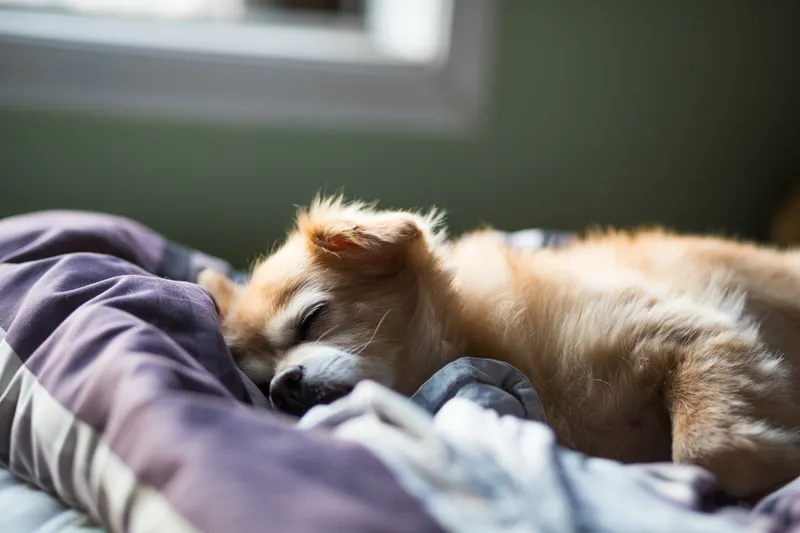What Does It Mean When My Dog Sleeps on My Pillow?
Understanding the Behavior
Does your dog always try to sleep on your pillow? You’re not alone. This behavior is more common than you might think and, while it may seem like a quirk or a simple quest for comfort, it carries deep emotional and instinctive meanings.
If you love your pet and have wondered why they insist on curling up right where your head rests, this article is for you. We’ll explore the reasons behind this habit and what it might mean for you and your furry best friend.

Is it common for dogs to choose the pillow?
Yes. Many dogs prefer sleeping on their human’s pillow. It’s not a coincidence — the reasons are tied to how they perceive you, their need for attachment, and natural instinct.
A whim or emotional need?
While it may seem like a spoiled attitude, it’s actually often a sign of the emotional bond between dog and human. Dogs are social animals that seek closeness and security, especially at night.
What Does It Mean When My Dog Sleeps on My Pillow?
Safety and emotional comfort
When a dog sleeps on your pillow, they’re telling you they feel safe with you. They are literally choosing your scent and proximity to relax and fall into deep sleep.
This canine behavior shows that the animal feels no fear and fully trusts you during their most vulnerable moment: sleep.
Strengthening the human-dog bond
Sleeping together can strengthen the emotional connection. Physical closeness promotes the release of oxytocin, known as the “love hormone,” in both dogs and humans. This hormone is linked to bonding, calmness, and emotional well-being.
Reasons Dogs Seek the Pillow
Pack instinct and birth habits
From puppyhood, dogs sleep next to their mother and siblings. This behavior persists into adulthood. In the wild, pack members sleep together to protect each other and maintain unity.
You are their pack now, and the pillow represents that intimate space where this ancient tradition continues.
Owner’s scent as a comfort trigger
The pillow retains one of the strongest and most constant scents of your body: your head. For a dog, their owner’s scent is a source of calm and familiarity. That’s why they seek your pillow and not just any corner of the bed.
Warmth, softness, and attachment
Dogs also seek body heat and soft surfaces. Your pillow offers all of that, plus the feeling of being close to you — which nurtures their attachment and trust.
Is It Good or Bad to Sleep With Your Dog?
Emotional and psychological benefits
Sleeping with dogs can bring many benefits:
- Increase in oxytocin.
- Decrease in cortisol (the stress hormone).
- Reduced anxiety and loneliness.
- Enhanced sense of safety.
These positive effects have been reported in both humans and dogs.
Scientific research findings
A study by the Mayo Clinic Sleep Center found that sleeping with dogs in the same room can improve sleep quality for owners. Additionally, research in Japan shows that close coexistence with pets enhances overall well-being and reduces symptoms of depression.
Risks: hygiene, allergies, separation anxiety
But it’s not all perfect. Sleeping with your dog can bring some downsides if certain aspects aren’t managed:
- Hygiene: presence of fur, dirt, or parasites.
- Allergies: potential reactions in sensitive individuals.
- Separation anxiety: if your dog depends on sleeping with you, they might develop anxiety when alone.
- Behavioral issues: difficulty respecting boundaries or private spaces you’ve set.
Encouraging Healthy Sleeping Habits for Dogs
Provide a personal bed
Even if your dog sleeps with you, it’s important that they have a comfortable bed of their own elsewhere in the home. This supports emotional independence and gives them a secure alternative space.
Set clear boundaries
If you decide you don’t want them sleeping on your pillow or bed, be consistent and firm. Reward them with affection when they use their bed and avoid giving in occasionally, as that creates confusion.
When to consult a vet or behavior specialist
Seek professional advice if you notice:
- Excessive attachment or dependency.
- Destructive behavior when they don’t sleep with you.
- Signs of intense anxiety when sleeping separately.
A vet or behaviorist can help establish healthier routines for both of you.
Final Thoughts and Recommendations
Your dog choosing to sleep on your pillow isn’t just a whim — it’s an act filled with love, trust, and instinctive connection. However, like everything in pet cohabitation, it needs balance.
Sleeping with dogs can offer great emotional benefits, but it may also lead to unwanted habits if boundaries aren’t in place. The key is to observe, understand, and train with love.
Final tip: If you want to stop them from sleeping on your pillow, show them equally cozy alternatives and stick to them. But if you enjoy sharing that moment, go ahead! Your dog is expressing their love in the purest way — without words.
Should You Let Your Dog Sleep With You? Checklist
- Are you allergic?
- Does your dog respect boundaries during the day?
- Is your sleep uninterrupted?
- Does your dog have their own bed as an alternative?
- Do they not show anxiety when sleeping alone?
If you answered “yes” to most of these, you can keep sharing your pillow with no problem!

